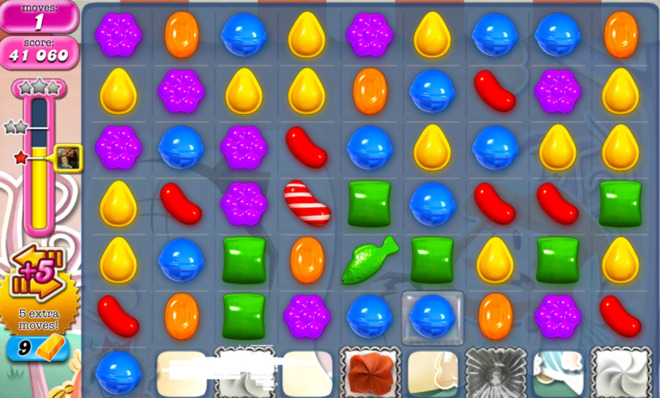The big problem with Candy™ Crush Saga
The gaming company has trademarked the word "candy"

A free daily email with the biggest news stories of the day – and the best features from TheWeek.com
You are now subscribed
Your newsletter sign-up was successful
A year ago, King.com Limited, the company behind the gaming sensation Candy Crush Saga, filed a claim that would seem like a shot in the dark — to trademark the word "candy," as it pertained to video games and clothing. But on Jan. 15, that claim was approved. And, as of Jan. 20, there are reports that all developers of games with the word "candy" in the title are receiving emails from Apple, informing them that they are in violation of trademark law.
As ridiculous as this seems, it's not the first case of a common word or phrase being trademarked. In 2012, the German gaming company Ravensburger successfully made a similar claim, gaining the rights to the word "memory." In 2009, reality TV star Rachel Zoe trademarked the word "bananas." And then there's the infamous trademark troll Leo Stoller, whom the The New York Times profiled in 2005, noting his claims to the words "stealth," "bootlegger," "hoax," and "chutzpah."
Not all such trademarks result in clear legal victories, however. There is a lengthy and rather obtuse criteria for trademark infringement that is supposed to keep ridiculous claims from bearing fruit. One particularly pivotal rule is that trademarks only apply within the industry in which the claimant's products operate. It's why despite the fact that the company Monster Cable has trademarked the word "monster," most of their nearly 200 attempts to sue other companies for usage of the word have failed.
The Week
Escape your echo chamber. Get the facts behind the news, plus analysis from multiple perspectives.

Sign up for The Week's Free Newsletters
From our morning news briefing to a weekly Good News Newsletter, get the best of The Week delivered directly to your inbox.
From our morning news briefing to a weekly Good News Newsletter, get the best of The Week delivered directly to your inbox.
But that rule doesn't protect other companies in the gaming industry, where the word "candy" was nearly ubiquitous in Apple's App Store until Monday's flurry of infringement emails, much less in the clothing industry, where King.com Limited's claim is tangential at best.
Take the case of Benny Hsu, an indie developer who created the game "All Candy Casino Slots – Jewel Craze Connect: Big Blast Mania Land" and is one of the many recipients of Apple's trademark infringement emails. Like many of those affected, he doesn't have the resources for a protracted fight in court. "Myself and other indie developers don't have the money or resources to fight back… I plan on changing the name if that is what I must do," he told Jim Squires of GameZebo.
But is that fair? Not to sound too much like a lawyer, but the answer is both yes and no.
Yes, from Candy Crush's perspective, the company is on firm legal footing: The term easily falls under the "descriptive" category of what's known as the "spectrum of distinctiveness" in trademark law. Moreover, the word "candy" is synonymous with Candy Crush Saga in the gaming industry, so it meets the "industry" rule as well.
A free daily email with the biggest news stories of the day – and the best features from TheWeek.com
But at a non-legal level, it all seems very absurd. In the case of Hsu, and many other developers who have also been restricted from using the word "candy," it's clear that the uses of "candy" were manifested independently and that the games pose no real threat to King.com Limited. Customers looking to play a Candy Crush Saga-type matching game aren't going to turn to a slot machine game such as Hsu's; there is no "likelihood of confusion," as decided in Polaroid v. Polarad.
As far as solutions are concerned, this case is the epitome of why trademark law reform is necessary in the U.S. In the Candy Crush example, the real problem seems to lie with the fact that "industry" is far too broad a measure to practically indicate competition. In situations like this one, where a product cannot reasonably be seen as competitive despite being part of the same industry, fail-safes, such as limiting the categorization of product types within industries, can prevent corporations like King.com Limited from unfairly taking advantage of smaller players in the field.
But it's important not to get caught up in the intricacies of the Candy Crush case. The biggest issue with trademark law is simple: It's too easy to get a trademark. The interpretation of "distinctive" that the U.S. Department of Trademark and Patent Offices currently uses has led to a major influx of meaningless trademarks of commonplace words. And while it's not an easy task to enforce a stricter definition of anything without judicial involvement, it is a key reform that must be made. Because what's happening now is just bananas™.
-
 The world’s most romantic hotels
The world’s most romantic hotelsThe Week Recommends Treetop hideaways, secluded villas and a woodland cabin – perfect settings for Valentine’s Day
-
 Democrats push for ICE accountability
Democrats push for ICE accountabilityFeature U.S. citizens shot and violently detained by immigration agents testify at Capitol Hill hearing
-
 The price of sporting glory
The price of sporting gloryFeature The Milan-Cortina Winter Olympics kicked off this week. Will Italy regret playing host?